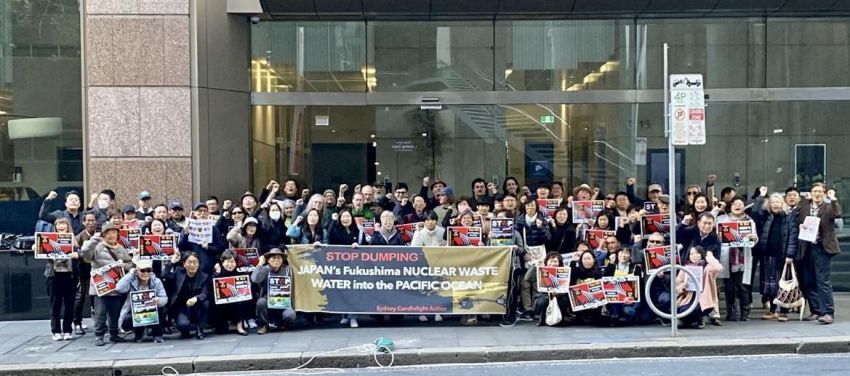
About 100 members of the Korean community and supporters protested outside the Japanese Consulate on July 1 against that government’s plan to release radioactive waste from the Fukushima nuclear reactor into the Pacific Ocean. It was organised by the Sydney Candlelight Action group.
Prime Minister Fumio Kishida is allowing the state-owned Tokyo Electric Power Company (TEPCO) to release 1.3 million tonnes of radioactive water from the Fukushima Daiichi Nuclear Power Plant into the Pacific Ocean over 30 years. A tsunami destroyed the plant in March 2011.
TEPCO is constructing an underwater tunnel to divert the radioactive water into the Pacific Ocean, beginning in the northern summer — the cheapest option. It would be safer to store the radioactive waste water on land, given it contains tritiated water, strontium 90 and 65 different radionuclides.
The waste water plan also has serious global ramifications. The Korean fishing industry will be the first affected. The fishermen in Fukushima, as well as others, oppose the radioactive water release plan.
The radioactive water is expected to reach Korea and China within seven months and, after three years, it will flow to the Pacific Islands, the Federated States of Micronesia and Palau and on to Australia and New Zealand.
It will not just endanger marine life, those who eat contaminated fish or swim in the radioactive water will also be affected. There is no way of legally proving that a cancer is the result of exposure to radioactive sea water.
Fish and seafood from Fukushima are not currently being sold in Japan but that country is seeking to lift neighbouring countries’ import bans.
Corporate media remains largely silent on the plan.
Australia also bears some responsibility as it sells uranium from the Ranger and Olympic Dam mines. The Australasian Nuclear Free Alliance said while the Australian government and BHP and Rio Tinto knew about the corruption in Japan’s nuclear industry, they kept supplying uranium.
The Chinese and South Korean governments opposed the radioactive water release plan. Australia has said nothing.
After Ecopella sang some songs, Greens MLC Cate Faehrmann read out a motion opposing the release of the radioactive water toxic she wants to put to parliament.
NSW Labor MLC Cameron Murphy, Reverend Moses Hans from the Castle Hill Presbyterian Church and James Miranda from the Electrical Trades Union also spoke. Nick Deane, from the Independent and Peaceful Australia Network (IPAN), condemned the waste water release and said AUKUS was another danger.
“Australia passed laws in the 1990s to prevent the establishment of a nuclear industry. Very recently, legislation has been introduced into the Federal Parliament to amend that legislation to make an exception — the exception being for nuclear power for propulsion for submarines …
“There is no known way to safely dispose of nuclear waste, but Australian leaders are determined to acquire nuclear powered submarines, threatening us with a nuclear future,” Deane said.
Representing Socialist Alliance, I also spoke against the plan, saying the federal government must take responsibility for past acts of moral culpability.
“If Japan is to go ahead with the dumping of radioactive waste, Australia should play a lead role in taking a case to the International Tribunal for the Law of the Sea against Japan.”
Meanwhile, the International Atomic Energy Agency claimed the release will have a “negligible” impact on the environment and complied with international standards.
The Nuclear Free and Independent Pacific Movement’s slogan from two years ago rings true: “If it is safe, dump it in Tokyo, test it in Paris and store it in Washington, but keep our Pacific Nuclear Free.”